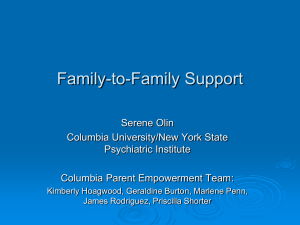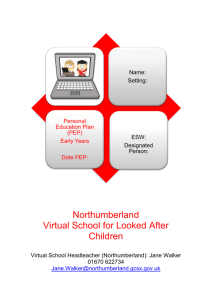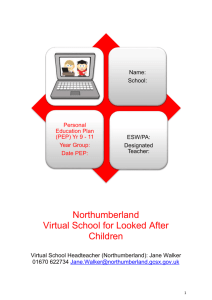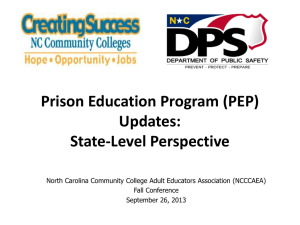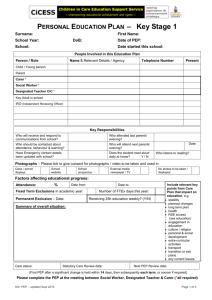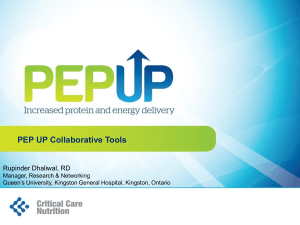(PEP) Training - Families Together In New York State
advertisement
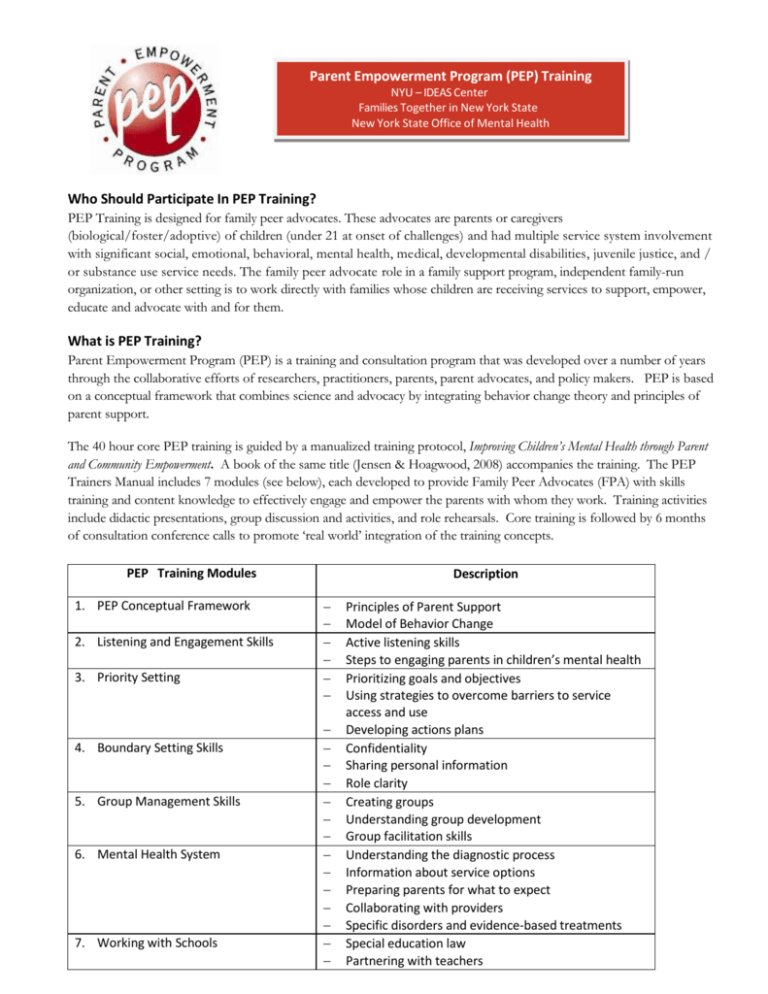
Parent Empowerment Program (PEP) Training NYU – IDEAS Center Families Together in New York State New York State Office of Mental Health Who Should Participate In PEP Training? PEP Training is designed for family peer advocates. These advocates are parents or caregivers (biological/foster/adoptive) of children (under 21 at onset of challenges) and had multiple service system involvement with significant social, emotional, behavioral, mental health, medical, developmental disabilities, juvenile justice, and / or substance use service needs. The family peer advocate role in a family support program, independent family-run organization, or other setting is to work directly with families whose children are receiving services to support, empower, educate and advocate with and for them. What is PEP Training? Parent Empowerment Program (PEP) is a training and consultation program that was developed over a number of years through the collaborative efforts of researchers, practitioners, parents, parent advocates, and policy makers. PEP is based on a conceptual framework that combines science and advocacy by integrating behavior change theory and principles of parent support. The 40 hour core PEP training is guided by a manualized training protocol, Improving Children’s Mental Health through Parent and Community Empowerment. A book of the same title (Jensen & Hoagwood, 2008) accompanies the training. The PEP Trainers Manual includes 7 modules (see below), each developed to provide Family Peer Advocates (FPA) with skills training and content knowledge to effectively engage and empower the parents with whom they work. Training activities include didactic presentations, group discussion and activities, and role rehearsals. Core training is followed by 6 months of consultation conference calls to promote ‘real world’ integration of the training concepts. PEP Training Modules 1. PEP Conceptual Framework 2. Listening and Engagement Skills 3. Priority Setting 4. Boundary Setting Skills 5. Group Management Skills 6. Mental Health System 7. Working with Schools Description Principles of Parent Support Model of Behavior Change Active listening skills Steps to engaging parents in children’s mental health Prioritizing goals and objectives Using strategies to overcome barriers to service access and use Developing actions plans Confidentiality Sharing personal information Role clarity Creating groups Understanding group development Group facilitation skills Understanding the diagnostic process Information about service options Preparing parents for what to expect Collaborating with providers Specific disorders and evidence-based treatments Special education law Partnering with teachers What makes PEP Different? The training is unique in that it is delivered by a training team comprised of family advocates and clinical partners. This is done to model collaborative partnerships between providers and parent/caregivers, a hallmark of the training. Clinical Partners are knowledgeable about children’s mental health. They work in practice settings in the community and are champions of family driven care. Family Peer Advocates in New York State are parents or caregivers (biological/foster/adoptive) of children (under 21 at onset of challenges) and had multiple service system involvement with significant social, emotional, behavioral, mental health, medical, developmental disabilities, juvenile justice, and / or substance use service needs. Family Peer Advocates have acquired the training, skills and experience to empower and assist other parents or caregivers of children with complex service challenges to navigate various systems to obtain appropriate and effective services. Family Peer Advocates work in a variety of settings to provide emotional support, information, advocacy, referrals to other families. Family Peer Advocates also work to assure that a family perspective informs decision-making at all levels. What is the PEP Training Initiative? This is a collaborative initiative of the New York State Office of Mental Health, Families Together in New York State, and New York University’s IDEAS center. The demand for PEP Training is growing as communities, providers, and families fully embrace the value of family-driven care and realize the power of engagement and empowerment. Over 500 Family Peer Advocates have successfully completed PEP Training and the reviews have been very positive. How do I sign up for PEP Training? PEP Training is designed for Family Peer Advocates working in any capacity (paid or volunteer, in any system) with families whose children have social, emotional, and behavioral challenges. If you are interested in participating or want more information about PEP Training, please call, email or check out the FTNYS website www.ftnys.org or to register for an upcoming training. How does PEP fit in to the New York State Family Peer Advocate Training and Credentialing Process? Families Together in New York State administers the Family Peer Advocate Credential program. The designation of ‘Family Peer Advocate’ is granted to individuals who meet (and maintain) certain requirements. To date, almost 300 Family Peer Advocate Credentials have been awarded. The intent of this credentialing process is to formally recognize the expertise of Family Peer Advocates, to ensure all advocates demonstrate core competencies, and to provide opportunities for professional growth and collaboration. Completion of the PEP training is a requirement of the credential. For more information on the FPA Credential, please visit the FTNYS website at www.ftnys.org For more information contact: Nancy Craig ncraig@ftnys.org 716-432-6238 Susan Burger sburger@ftnys.org 516-314-1143 Laurie Rivera lrivera@ftnys.org 518-432-0333 X 18 or visit www.ftnys.org.
